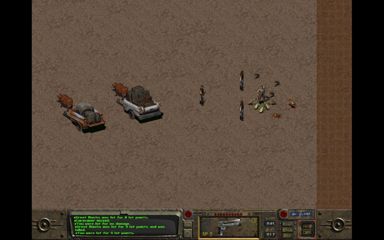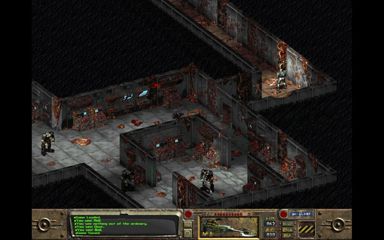Fallout (1997)
The Only Winning Move is Survival.
It’s no secret, and no joke, that I’ve got a large gaming backlog to deal with. Just as I call myself a ‘reader’ but have never finished War and Peace, David Copperfield, or any of the Discworld novels, my unfinished video game list also calls me a poseur. At the time of this writing, I’m looking at an incomplete Legend of Zelda: Ocarina of Time, Majora’s Mask, Metroid Prime, and Skyrim.
Until recently, the first game in the Fallout series also wore this unflattering crown. My journey toward finishing it began long ago with a game called Fallout 3. I played and I loved it, until Fallout: New Vegas arrived a year later. Suddenly it didn’t make sense why the Capitol Wastelanders sent me to plunder ancient grocery stores instead of growing fresh food. Actually, a lot of Fallout 3 made less sense after I beat New Vegas.
I played, and loved, Fallout: New Vegas for fifteen years. Eventually, the Fallout lore got me curious enough to investigate the story’s beginning. But now I ran into a problem. The original Fallout has a tendency to divide newcomers with its infamous main quest time limit. If I took this on, running out of time meant having to restart a half-finished game over from scratch. Fearing this, I put it aside for awhile. Recently, though, two back-to-back replays of New Vegas left me wondering how cruel the original Fallout really was. I took the risk and jumped into it.
Fallout introduces us to an alternate timeline, where American 1950s nationalism, paranoia, and McCarthyism never ended for over a hundred years. Then America clashed with China, the ultimate Red Scare Final Boss, in a war that ended in nuclear destruction. In the aftermath, the idealized World of Tomorrow from ‘50s classroom filmstrips became a post-apocalyptic hellscape, full of mutated Roger Corman monstrosities.
Almost 60 years later, human colonies have outlasted the hellish Wasteland left in the war’s aftermath by hiding, eating, sleeping, and breeding, in huge underground Vaults. It’s here you, the player, create your Vault Dweller character, assigning gender, stats, traits, all the usual details. Following that, the Vault’s ruling Overseer explains that the facility’s water chip is failing. Without it, the Vault will run out of drinking water. For the first time in your life, you must venture beyond the doors.
The world outside the Vault is is a bleak, broken place, where Raiders and mutated rats are far from your worst problems. Humanity has recovered enough to transform the most salvageable buildings into homes and businesses. Two-headed cows pull broken husks of cars, serving as trade caravans between the towns.
The Vault Dweller has 150 in-game days to find and deliver the water chip, or it’s game over. This presents a sense of urgency not often seen in open world RPGs. While 150 days sounds fair at first, traveling across the overworld map quickly dwindles down the hours and days.
Completing the objective turns the Vault Dweller loose to explore with far less restrictions, free to level up and take on sidequests. They then uncover a bigger issue that threatens much more than their humble Vault home. Mutated humans—Super Mutants, if you will—are spawning in alarming numbers, attacking settlements and caravans.
This is where one of my contentions with Fallout lies. Learning the Super Mutants’ means and motives requires traversing the depths of an optional irridated bomb crater to uncover an info dump. Otherwise, without the more-modern aid of a Wiki, the relevant details aren’t present. It’s a weird, unconventional approach to storytelling, since most of us play RPGs for the story as much as the gameplay. It wouldn’t be as bad, if not for the fact that escaping this dungeon alive requires prior preparation, the likes of which aren’t obvious, either. In other words, it’s that early Dragon Quest “explore everywhere and figure it out!” kinda shit, aimed at players who used to have a lot more time.
As for the initial time limited main quest, it does not take that long to find the water chip if you know what you’re doing. Being hassled with a potential softlock was, of course, what made me apprehensive about working through Fallout in the first place. If I were to play this a second time, however, I could easily grab the water chip from memory.
I do get why this could alienate more modern players, though. We’ve had several decades worth of open-world, free roaming RPGs to enjoy since 1997. The sheer amount of side content is often so appealing that we’re used to ignoring main quests as long as possible. Like, fuck finding Ciri when there’s cards to play and monsters to hunt. Players don’t want to be punished for enjoying what they paid for.
Fallout, though, takes a difference approach with this. It suggests that the world isn’t yours. It belonged to people once, but they burned it to cinders. Now your plight is to suffer the consequences of your predecessors’ actions. If you want to run around and play in the Wasteland, the Wasteland first demands payment.
I played ‘Version 1.2,’ which contains all the current improvements since the old CD-ROM version. Believe it or not, vanilla Fallout was even more demanding than this. At one point, you had another time cap, 500 days, to stop the mutants before they overran the entire map, including your Vault. In other words, you still weren’t free to RPG as you pleased. In 1.2, they’ve increased the time limit enough so you can finish everything with no penalties.
In typical RPG fashion, when you’re not exploring or working on sidequests, you’ll be engaged in battles. Combat in Fallout is turn-based, with allotted Action Points in each round governing everything from attacking, moving, and using your inventory.
Combat is straightforward, though sometimes tedious. During encounters with large enemy groups, you must wait for each individual unit to spend its own points stepping toward you, one by one by one. This drag is especially grueling when you’re already frustrated. There were encounters where I had twelve enemies on the screen at once. While each one took his sweet time moving, I waited forever for my turn to start.
Compared to its predecessors, Fallout is relatively short, with a limited number of overworld map locations. By the time you’ve discovered them all, the main campaign is almost over.
That didn’t matter when I played, though; I ran into enough broken, unexpected, and unfair shit that I started over twice. It took a few harsh lessons before I learned to make mutliple saves, an absolute necessity in this game. By the end, I had a main save, a backup save, and a save for every new town I entered. This anal retentive attention toward saving turned out to be wise, indeed. There were, in fact, places where I could’ve needed a third restart.
Save scumming ended up helping me in another vital way as well. This Fallout has a strong inclination toward crashing. Granted, I have dealt with worse; other games throughout my sedentary history were royally unplayable with how crash happy they were. Fallout still crashed a lot, however. Here I was, reloading a save enough times to finally survive a shootout with eleven Raiders, only to get that dreaded, garbled error alert. It was just as unnerving as landing on an overworld tile full of Deatchlaws.
As I feared future crashes, I read about a supposed patch I should’ve installed. But at no point did I acquire said patch. I rawdogged this game, trusting the developers/current retainers to provide a stable enough experience. Plus, I was playing Fallout on my Steam Deck. While I don’t mind tinkering with my Deck to run emulators or replace components, I was too lazy to work on it here.
Although I sound negative here in several places, my experience with Fallout was not an overall bad one. I grew up in the era when innovative and creative endeavors were finding their legs. I’ve played all the way through Baldur’s Gate, another CRPG full of jank and potential exploits. I expect ‘90s RPGs to behave this way. Rather than view it as a determent, I see it as part of the charm.
And without the first Fallout, we would not have a Fallout franchise. We wouldn’t have the much larger, less restrictive second game. We wouldn’t have the divisive 3, the mind blowing New Vegas, the…city building 4, or Tactics and Brotherhood of Steel, which you now remember. This first game has clumsy growing pains, but it’s an ambitious mess, all the same. A commendable opening act.
Final Grade: ***

